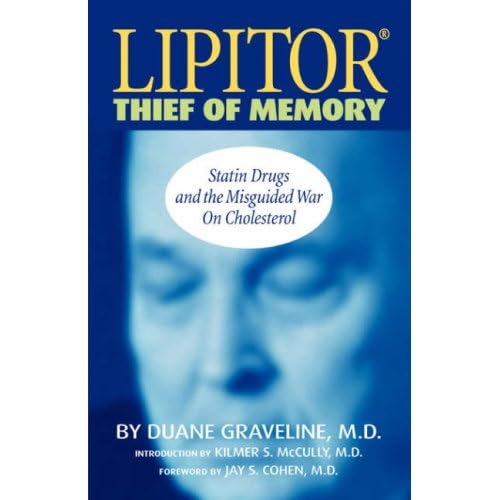Many of these drugs have known side effects like:
- Abdominal Pain
- Arrhythmia
- Asthenia
- Myalgia
- Myopathy
- Pancreatitis
- Rhabdomyolysis
- Kidney Failure/Dialysis
- Hospitalization
- Death
Scientist raises fears over statins and Parkinson's +Here are some highlights from the article:
Dr Xue Mei Huang, an assistant professor of neurology at the University of North Carolina's School of Medicine, was "very concerned" by her study's findings and plans a 16,000-patient survey to examine the possible role of statins.
Dr Huang, whose study was published in the journal Movement Disorders, said there was a well-established link between Parkinson's and apoE2, a gene associated with lower LDL cholesterol.
Participants in her study with LDL levels lower than 114 mg/dl (milligrams per decilitre) had a 3.5-fold higher risk of Parkinson's than participants with LDL levels of more than 138 mg/dl.
It was unclear, however, whether the low cholesterol levels in those with Parkinson's predated the disease.
Asked whether she was worried by the initial results, Dr Huang told Chemical and Industry magazine: "Yes I am very concerned, which is why I am planning a 16,000-patient study to examine the possible role of statins."
Dr. Ronald Ziman, a California neurologist and board member of the American Parkinson Disease Association, said he is intrigued by the study.
"Parkinson's is a neurodegenerative illness like Alzheimer's. We know lipid profiles have a bearing on Alzheimer's, and there are a lot of similarities between Parkinson's and Alzheimer's. So I wouldn't be surprised by the link" between LDL and Parkinson's that the University of North Carolina team described," Dr. Ziman said.
Duane Graveline MD MPH was a former USAF Flight Surgeon, NASA Astronaut and retired family doctor. He wrote a provocative book calledLipitor Thief of Memory
 to warn people about what needs to be done to prevent the devastating side effects to body and mind from the escalating use of the statin drugs.
to warn people about what needs to be done to prevent the devastating side effects to body and mind from the escalating use of the statin drugs.Statin drugs work by inhibiting the HMG-CoA reductase enzyme which is what lowers the LDL (bad) cholesterol. At the same time, it also inhibits the production of Coenzyme Q10. Every human cell contains a cellular power plant called the "Mitochondria." This is where food is converted to energy. Ninety-five percent of all the human body’s energy requirements (ATP) is converted with the aid of CoQ10. The heart and the liver have the highest energy requirements and without CoQ10, it could eventually lead to a heart attack and/or liver failure.
Dr. James Whittaker petitioned the FDA in 2002 to put a warning label on every bottle of statin drugs. The warning label read:
Warning :
HMG CoA reductase inhibitors block the endogenous biosynthesis of an essential co-factor, coenzyme Qlo, required for energy production. A deficiency of coenzyme QlO is associated with impairment of myocardial function, with liver dysfunction, and with myopathies (including cardiomyopathy and congestive heart failure). All patients taking HMG CoA
reductase inhibitors should therefore be advised to take 100 to 200 mg per day of supplemental coenzyme Q~Recent studies have shown that the antioxidant properties of Coenzyme Q10 benefit the body and the brain in animal models. Some of these studies indicate that Coenzyme Q10 protects the brain from
 neurodegenerative disease such as Parkinson's, although it does not relieve the symptoms. Dosage was 300 mg per day. Consumption of 100 to 200 mg per day of CoQ10 can reverse CoQ10 depletion induced by statins. It is interesting to note that Merck Pharmaceuticals has obtained a patent for the combination of CoQ10 with statins in one prescription dose.
neurodegenerative disease such as Parkinson's, although it does not relieve the symptoms. Dosage was 300 mg per day. Consumption of 100 to 200 mg per day of CoQ10 can reverse CoQ10 depletion induced by statins. It is interesting to note that Merck Pharmaceuticals has obtained a patent for the combination of CoQ10 with statins in one prescription dose.I took my parents off of Zocor about 5 years ago after discovering that heart disease is not a disease of high cholesterol. Most people who die of a heart attack or stroke do not have high cholesterol and statins could actually cause you to have a heart attack. Read two of my other posts on this subject.
The Cholestrerol Conspiracy
Debunking The Cholesterol Myth
In addition to that, my father had peripheral neuropathy (numbness and pain) in his hands and lower legs, pain in his spine and memory loss. The pain in his spine was so great that we were scheduled for a back operation with an orthopedic surgeon. For many years, he got steroid shots in his spine every so often to ease the pain. We got another opinion from a Neurosurgeon and decided against the surgery. We opted to try physical therapy, changes in diet, a pharmaceutical-grade multivitamin and stopping the statin drug Zocor.
He has been pain free for over five years now. I am so glad we did not do the operation on his back. Even his nagging arthritis is mostly gone. We went to the doctor recently and found that his cholesterol is normal without the use of statin drugs. Here is the kicker, though. Our doctor asked me if I would like to put him back on Zocor. Can you believe that? I was almost speechless.
I am angry though. Although I cannot prove it, I strongly suspect that all those years of taking Zocor is one of the root causes of their physical and mental decline. Lowering their LDL cholesterol and depriving their cells of Coenzyme Q10 for all those years was not a good thing if it caused them to have neurodegenerative diseases like Parkinson's and Alzheimer's. I will wait for the study by Dr. Huang to be completed and see what they find.
Lowering your LDL cholesterol will NOT keep you from having a heart attack. Click here to find out why you can have PERFECTLY NORMAL LDL cholesterol and still have heart disease. For those of you who are interested in raising your HDL cholesterol naturally and are not getting answers from your doctor on how to do this without drugs, I suggest a three pronged approach:
- Eat a healty diet that encourages you to eat those good carbohydrates, good fats, and good proteins.
- Start a modest but consistent exercise program.
- Take high-quality nutritional supplements every day
Other articles of note:
Cholesterol is NOT the Cause of Heart DiseaseHigh Cholesterol Does Not Cause Heart Disease
**Update as of February 2012
The FDA has finally seen fit to put a "Black Box" warning on all statin (cholesterol lowering) drugs. It warns of a connection between the use of statin drugs (Zocor, Lipitor, Crestor, Mevacor, etc.) and getting diabetes and memory loss and confusion (dementia, Alzheimers, Parkinson's, etc.).
Click on the following links to read about it.
Forbes - The Latest Statin Scare: Are You At Risk
Black Box Warning Labels for Statin Drugs
 My StumbleUpon Page
My StumbleUpon Page






4 comments:
Malignant mesothelioma affects the lining or membranes of certain large cavities in the body. These cavities, called the serous cavities, house certain major organs in the body including the heart, lungs, abdomen and others. The membranes that surround these cavities are called the serous membranes. They serve to protect these major organs from the friction and abrasion that occur as the organs move against each other during typical daily functioning, such as breathing and heart beating. The serous membranes derive from specialized cells called mesothelial cells. These cells form to create the mesothelium, which is the major tissue layer of the serous membranes. Cancer that occurs in the mesothelium tissue is called mesothelioma.
Mesothelioma is a rare & uncommon type of cancer which is almost always caused by exposure to asbestos. In mesothelioma, malignant type cells form and develop within the mesothelium. These cells also cover the outer surface of most internal organs. The tissue formed by these cells is called mesothelium. Mesothelioma is most common in the pleura which is the outer lining of the lungs, but it can also arise in the peritoneum or the pericardium which protects the heart.
Who originally wrote about the statins and Parkinsons? I would like to communicate with this person as I have long suspected that long term use of statins are responsible for my father's PD.
Anonymous, I would go to Dr. Duane Graveline's website:
www.spacedoc.net
as he has done extensive research on the role of statin drug use and cognitive decline (Alzheimers and Parkinsons). He has written several books on the misguided war on cholesterol and how it affects our brains. The two most recent ones are, "Statin Drugs Side Effects and the Misguided War on Cholesterol" (2004) and "The Dark Side of Statins" (2010)
Update as of February 2012
The FDA has finally seen fit to put a "Black Box" warning on all statin (cholesterol lowering) drugs. It warns of a connection between the use of statin drugs (Zocor, Lipitor, Crestor, Mevacor, etc.) and getting diabetes and memory loss and confusion (dementia, Alzheimers, Parkinson's, etc.).
Click on the following links (above) to read about it.
Forbes - The Latest Statin Scare: Are You At Risk
Black Box Warning Labels for Statin Drugs
Post a Comment